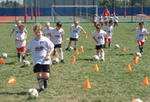|
Growing
Steps
 Youth soccer coaches need to bear in mind
the physical and mental age of their players
when planning their training sessions. Youth soccer coaches need to bear in mind
the physical and mental age of their players
when planning their training sessions.
This might seem like stating the obvious but
many coaches experience discipline problems
simply because their plans are too ambitious
or too easy for their players.
Also, some coaches expect their players to
master skills or techniques that they are
simply not capable of at their age. For
example, children up to the age of about ten
may lack the physical ability to lock their
ankle; a skill that is necessary to
accurately strike a ball. There's not much
point, then, to get frustrated with an eight
year old who can't hoof the ball from one
end of the pitch to the other!
Coaches whose players are aged up to six or
seven years old should also bear in mind
that young children are very egocentric;
they see the world only from their
perspective. As a result, they are not
going to want to pass the ball to their team-mates.
They're worried they might never get it back!
So don't be surprised that it's difficult to
get six year olds to stop swarming round the
ball. Also, young children lack the ability
to look ahead and see what is about to
happen. This is a limiting factor that
coaches need to bear in mind when teaching
how to attack the ball at corner kicks, for
example.
 So....when designing practices coaches need
to take into consideration the age
characteristics of their players. Activities
should be picked that fit the developmental
needs of the children, rather than trying to
make the children participate in activities
that are developmentally inappropriate for
them. So....when designing practices coaches need
to take into consideration the age
characteristics of their players. Activities
should be picked that fit the developmental
needs of the children, rather than trying to
make the children participate in activities
that are developmentally inappropriate for
them.
What are developmentally appropriate
exercises?
When picking activities always remember what
the
game of soccer is like
- players are
moving around constantly. Because everyone
is moving the environment is constantly
changing which requires players to be
constantly making decisions. It is because
of this that practice games are more
effective than 'drills' at teaching kids how
to play soccer, even when dealing with
techniques like how to pass the ball.
Many coaches choose to do drills that
involve players standing in lines waiting to
have a turn. This type of drill is not 'soccer-like'.
No child should be encouraged to stand in a
line and wait a turn. There are plenty of 'soccer-like'
practice games that can be used to teach any
technique or tactical concept.
Finally....
 Enjoyment is the unifying motive. Some
children don't want to learn. Some don't
care about winning. A few have no interest
in hard work and one or two can't remember
which goal they're attacking. In spite of
all of their different agendas they all want
to have fun and play a game, that is what
brings them there. Enjoyment is the unifying motive. Some
children don't want to learn. Some don't
care about winning. A few have no interest
in hard work and one or two can't remember
which goal they're attacking. In spite of
all of their different agendas they all want
to have fun and play a game, that is what
brings them there.
They also want to be children. Too often the
coach sees them as an extension of his
vision and they become puppets to it. The
time spent at
practice and at the games is a
part of their childhood. It should not
reflect the adult world. Some adults forget
this and their expectations take the fun out
of the experience. Take time to consider
your coaching style and understand that your
expectations and hopes may not be shared by
the children you're coaching. |